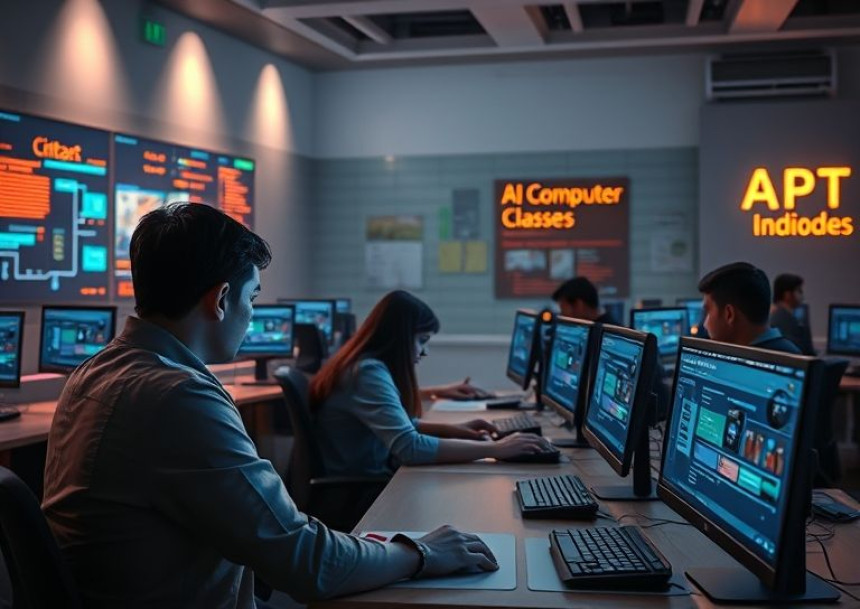Smart Contract Best Practices for Developers — How-To
Smart Contract Best Practices for Developers — How-To. Get practical lessons and hands-on examples at AIComputerClasses in Indore to master blockchain skills quickly. This article from AIComputerClasses Indore breaks down smart contract best practices for developers — how-to into actionable steps. Ideal for beginners and working professionals seeking fast skill gains. Follow practical exercises and tool-based examples to learn rapidly.
🔗 Smart Contract Best Practices for Developers — How-ToSmart contracts are at the heart of blockchain innovation — self-executing agreements that automatically enforce rules and conditions without intermediaries. 🌐
But with great power comes great responsibility. Even a small coding mistake can lead to massive financial loss (remember the DAO hack?). That’s why developers must follow best practices to ensure security, efficiency, and reliability.
In this guide by AI Computer Classes, Indore, we’ll walk through the most effective smart contract best practices every developer should know — from writing secure Solidity code to deploying safely on the Ethereum network. 🚀
A smart contract is a program that runs on a blockchain, typically on Ethereum.
It automates the execution of an agreement — once predefined conditions are met, the contract executes automatically.
🔍 ExampleImagine a decentralized crowdfunding app. When total funds reach the target, the smart contract automatically transfers the collected amount to the project owner — no bank, no delay.
Let’s dive into the most essential smart contract best practices developers should follow 👇
Always use the latest stable version of Solidity to get access to security fixes and improved syntax.
pragma solidity ^0.8.0;
🔒 Solidity 0.8+ includes automatic overflow/underflow protection, reducing common vulnerabilities.
Never hardcode wallet addresses or private keys directly in your smart contract. Instead, use configurable variables or constructor parameters.
address public owner;
constructor(address _owner) {
owner = _owner;
}
This ensures flexibility and reduces risks during deployment.
Access control defines who can call what function. Use modifiers like onlyOwner or leverage libraries like OpenZeppelin’s Ownable.
modifier onlyOwner() {
require(msg.sender == owner, "Not authorized");
_;
}
Always restrict sensitive functions such as fund transfers or configuration updates.
The infamous DAO hack exploited a reentrancy vulnerability, allowing attackers to repeatedly withdraw funds before the balance updated.
✅ Use the Checks-Effects-Interactions pattern:
- Check conditions
- Update state
- Interact with external contracts
Example:
function withdraw(uint amount) public {
require(balances[msg.sender] >= amount);
balances[msg.sender] -= amount;
payable(msg.sender).transfer(amount);
}
Or simply add a ReentrancyGuard from OpenZeppelin.
Validate all input parameters to prevent unexpected behavior.
require(amount > 0, "Amount must be positive");
Even small unchecked inputs can break logic or consume excessive gas.
Smart contracts with high gas usage can fail or become expensive to run. Optimize loops and calculations:
- Avoid large on-chain data storage.
- Use events for logging instead of arrays.
- Keep logic modular and efficient.
Events act like on-chain logs that notify external systems about actions.
They make debugging and auditing easier.
event FundsTransferred(address indexed to, uint amount);
Use them for all critical actions — payments, ownership transfers, and updates.
Before deployment, always audit your contract manually and with tools like:
- MythX – vulnerability scanner
- Slither – static analysis tool
- Remix IDE – quick syntax and gas checks
Professional audits are highly recommended for production-level projects.
💡 Join Blockchain Development Classes in Indore!
At AI Computer Classes, you’ll learn hands-on smart contract development with real-time examples.
👉 Enroll for our latest Blockchain & Web3 Course today!
📍 Old Palasia, Indore
🧠 Additional Best Practices✅ Keep contracts upgradeable using patterns like Proxy or UUPS.
✅ Store critical configuration in immutable variables where possible.
✅ Separate business logic and data storage for maintainability.
✅ Test extensively with Truffle, Hardhat, or Foundry.
Example test snippet (Hardhat + JavaScript):
const { expect } = require("chai");
it("Should transfer funds correctly", async function () {
await contract.connect(addr1).deposit({ value: 100 });
await expect(contract.connect(addr1).withdraw(100))
.to.emit(contract, "FundsTransferred")
.withArgs(addr1.address, 100);
});
🔎 Security Tools Every Developer Should KnowToolPurposeMythXDetects common vulnerabilitiesSlitherAnalyzes Solidity for bugsRemix AnalyzerChecks gas optimizationOpenZeppelinPrebuilt secure contractsTenderlyReal-time monitoring & debugging
Using these tools together ensures your contracts are safe before mainnet deployment.
✅ Security: Avoid costly vulnerabilities and hacks.
✅ Efficiency: Reduce gas costs and optimize performance.
✅ Maintainability: Easier upgrades and debugging.
✅ Scalability: Prepare your DApps for high transaction volume.
✅ Trust: Build user confidence through transparent and predictable contracts.
🧭 ConclusionSmart contract security is not optional — it’s essential.
By following these best practices, developers can create secure, efficient, and scalable blockchain applications.
At AI Computer Classes – Indore, we train students in Blockchain, Web3, and Smart Contract Development with real-world projects. You’ll learn Solidity, Ethereum workflows, and hands-on deployment — the complete blockchain developer toolkit.
Whether you’re a beginner or a working professional, it’s time to upgrade your skills and join the next generation of blockchain innovators. 🚀
📞 Contact AI Computer Classes – Indore
✉ Email: hello@aicomputerclasses.com
📱 Phone: +91 91113 33255
📍 Address: 208, Captain CS Naidu Building, near Greater Kailash Road, opposite School of Excellence For Eye, Opposite Grotto Arcade, Old Palasia, Indore, Madhya Pradesh 452018
🌐 Website: www.aicomputerclasses.com





